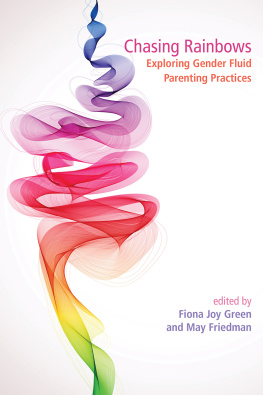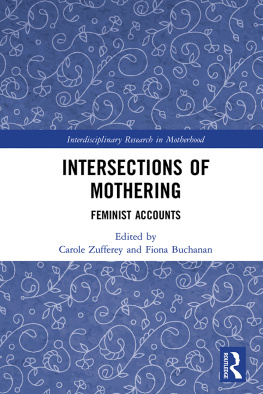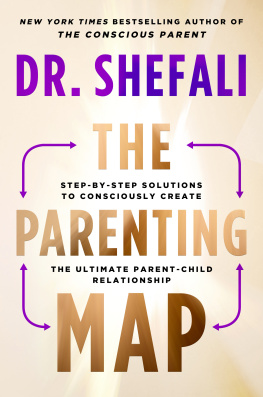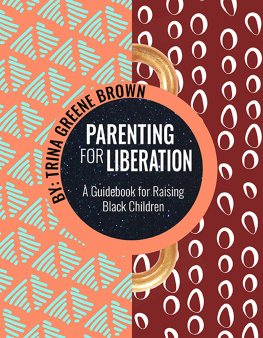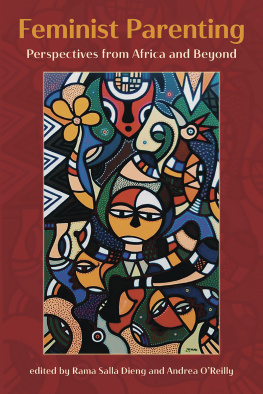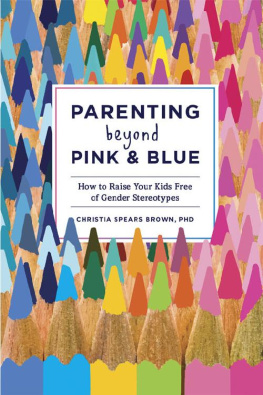Chasing Rainbows
Exploring Gender Fluid
Parenting Practices
Chasing Rainbows
Exploring Gender Fluid
Parenting Practices
Edited by
Fiona Joy Green and May Friedman

DEMETER PRESS
Copyright 2013 Demeter Press
Individual copyright to their work is retained by the authors. All rights reserved. No part of this book may be reproduced or transmitted in any form by any means without permission in writing from the publisher.

The publisher gratefully acknowledges the support of the Canada Council for the Arts for its publishing program.
Demeter Press logo based on the sculpture Demeter by Maria-Luise Bodirsky < www.keramik-atelier.bodirsky.de >
eBook development: WildElement.ca
Printed and Bound in Canada
Library and Archives Canada Cataloguing in Publication
Chasing rainbows : exploring gender fluid parenting
practices / edited by Fiona Joy Green and May Friedman.
Includes bibliographical references.
ISBN 978-1-927335-18-5 (pbk.)
1. Parenting. 2. Feminism. 3. Sex role. I. Friedman, May, 1975-,
editor of compilation II. Green, Fiona J., editor of compilation
HQ755.8.C43 2013 649'.1 C2013-906388-9
Demeter Press
140 Holland Street West
P. O. Box 13022
Bradford, ON L3Z 2Y5
Tel: (905) 775-9089
Email: info@demeterpress.org
Website: www.demeterpress.org
To the parents and children who are bravely
and courageously living their lives by honouring
and supporting fluid gender expression
Table of Contents
Acknowledgements
This book has been a labour of love inspired by the many parents, children and families around us who experiment with gender and self-expression in radical and innovative ways. In particular, this book began from many conversations provoked by the brave words and actions of Kathy Witterick and David Stocker; we are in awe of their strength and so very grateful for their hard work. Likewise, the contributors to this volume have courageously pushed forward in both personal and scholarly contexts to uphold the need for gender fluidity.
Without the support of Demeter Press, there would be no venue for us to explore these topics; to Demeter and especially our editorial matriarch, Andrea OReilly, we give great thanks. May would like to especially thank her family of origin, her family of now, and her families of choice for constantly participating in stimulating and complicated conversations. Fiona is particularly thankful for her partner, son, students and colleagues who courageously explore gender self-expression and persistently examine theories of gender identity. She is also most grateful for her siblings never wavering belief in and support of her parenting practices.
Introduction
MAY FRIEDMAN AND FIONA JOY GREEN
S OME DAYS IT FEELS LIKE the present moment has never been more ripe for exploration of gender fluidity. Thomas Beatie, the pregnant man (Beatie), books such as Kate Bornstein and Bear Bergmans collection Gender Outlaws: The Next Generation and myriad blogs exploring gender fluidity and experimentation, suggest that gender may be increasingly viewed more effectively as a continuum rather than a binary. This is hardly news to feminists who have delved into Judith Butler and Bornstein; to activists who have pushed for the right to transition; for many people who have welcomed the slippery play of gender instead of its rigid binary outlines. Yet the backlash to every effort to explore gender in creative and non-normative ways suggests that, in the midst of these exciting fissures and pressure points, gender continues to serve as a stolid and uncompromising arbiter of human behaviour, and that efforts to transgress strict gender binary are incredibly risky. Chasing Rainbows: Exploring Gender Fluid Parenting Practices seeks to explore the tensions between both an increasing exploration of gender and the turgid intransigence of the expectations of parents to raise blue boys and pink girls to become good (and obedient) men and women.
Feminist parents may attempt to resist gender binaries; they may submit to them while attempting to foster critical dialogue; they may struggle with the display of their own femininity and masculinity or, for some, its perceived lack. For some parents a dialogue about gender normativity may be inspired by gender-diverse behaviour on the part of their own children, while others may parent children who happily submit to the mainstream and query the need for gender questioning. This collection casts a lens on the messy and convoluted ways that querying parents approach parenting their children in gender aware and gender fluid ways. Scholars, activists and community members have participated in a conversation about the challenges of exploring and maintaining an awareness of gender while parenting in a highly gender normative world.
Tey Meadow suggests that, Over the last century, there has been a proliferation within biomedicine, psychiatry and popular culture, of the ways in which we can know gender; and as a result, individuals are called upon to understand and communicate our gender in ever increasing detail (727). More colloquially, Kate Bornstein professes herself thrilled with the evolution of gender play, awed by the heights from which this gen[eration] of gender outlaws has leapt off into their unexplored spaces. People today are STARTING from further than I go to when Id finished writing Gender Outlaws (Bornstein and Bergman 11). Many of the contributors of this book are living and parenting in ways that are transgressive and risky, and are exploring new fractures in the gender bulwark, responding to cultural shifts about gender fluidity, gender non-conformity and gender awareness. Lest we become self-congratulatory, however, the backlash continues and can be seen in the event which inspired this collection: the birth of a baby named Storm.
STORM
This collection aims to explore some of the ways that parents are choosing to respect gender fluidity through their personal expression and/or the ways parents are raising children to honour their childrens fluid expression of gender. The book was highly influenced by the brave actions of a Canadian family in 2011 that spurred international publicity, interest and debate.
The decision of Toronto parents Kathy Witterick and David Stocker to keep the sex of their youngest child, Storm, a private matter among themselves, their other children, and a family friend and the midwives present at Storms birth, was made partly in response to watching their first two children, then five-year-old Jazz and three-year-old Kio, as well as adults in their lives, express their gender in ways that are considered by most to be unconventional. Witterick and Stocker believe children are capable of making their own decisions and want to reduce the constraints of whats expected to be male or female placed on their children. Before becoming parents, Witterick was engaged in feminist activism and worked as the provincial and then national lead trainer on healthy child development for a research-based child advocacy group, before delivering violence and abuse prevention workshops in high schools around Ontario for years with the Canadian Red Cross. Stocker worked at an alternative school based on anti-oppression and social justice work with youth for over a decade and is the author of an award-winning book linking the teaching of mathematics with social justice issues. Drawing on these experiences, doing some further research, and speaking with Jazz and Kio, they chose to keep Storms sex private among their family. They believe the best way to nurture, honour and respect Storms development is to allow Storm the time and space to explore and feel comfortable with her/his gender identity and expression. They are sure that Storm will let folks know when the time is right.

